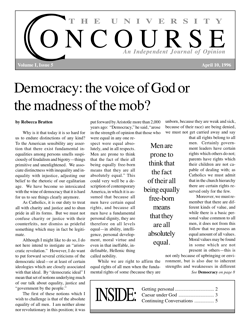Getting personal
by the editors
In the weeks since the Concourse first appeared, the editors have received numerous comments to the effect of the following: “You should stick to the issues and not let the articles get personal.” These have come to us with such frequency lately (particularly apropos of the “rock” exchange between Andy Minto and Mark Fischer in the March 12 issue) that we feel the need to make our editorial principles and policies more explicit.
In one sense, we agree entirely that articles should not get personal. In general, attention should be directed to the issue under consideration, not to the characters of those involved. (Had Minto replied to Fischer’s article by saying,“This sort of idiocy is typical of Fischer, who is an arrogant jerk in every way,” we would not have printed it.) Neither should a writer impute motives or psycho-analyze his “opponent.” (Had Fischer surmised publicly that “Minto obviously must have had some bad experience as a child that makes it impossible for him to view the music issue rationally,” we would not have printed it.) Avoiding such personal jabs and imputations is clearly a basic requirement of courtesy in discourse.
But very often when people say “you should not allow the articles to get personal” they mean something more than this. They mean that opinions should remain very generalized in expression, and should above all avoid “naming names”—as if that were the litmus test of courtesy. And with this we simply do not agree. We think articles are most helpful and most respectful when they are most direct and concrete. Likewise, those which neglect to be specific are typically both unfruitful and discourteous.
Recall how President Clinton blamed “right-wing extremist radio talk show hosts” for the Oklahoma City bombing. When Rush-fans protested the obvious slur, Clinton side-stepped by saying he had not meant to implicate Limbaugh, but rather other (nameless) radio hosts. But at the same time practically every news agency followed up the report of the speech with a “we all know who he meant” story featuring Rush Limbaugh as the Big Daddy of right-wing extremism. The public were inflamed and polarized—those already disposed against Rush had fresh occasion to vilify him and his fans; those who admired him swelled with indignation and resentment; those unfamiliar with him were unfairly prejudiced against him. He was very effectively smeared. If he tried to defend himself he was accused of megalomania and paranoia. And meanwhile, Clinton’s vagueness exempted him from the responsibility to back up his claims with solid evidence.The president would have been much more considerate (both to Limbaugh and to the public) had he spelled out his meaning more plainly. As it was, his veiled charges served only to spread discord and dissatisfaction.
The same is true on a local level.
We have more than once had someone advise us that “there are ways of writing about people so that everyone knows whom you mean, without your having to mention names”—as if this were kinder and “more Christian” than a direct, face-to-face challenge! We could hardly agree less. As we see it, nothing spreads tension and misunderstanding like unspecified insinuations. Conversely, nothing advances a good discussion like forthright avowal of a particular point of view, backed up by concrete examples.
Furthermore, if someone has taken a public stand on a controversial issue, we think he is best respected when it is assumed that he meant what he said, and that, if challenged, he is prepared either to defend, amend or retract his view. On the other hand, tip-toeing around his feelings, and refusing to engage him in open dialogue, would seem to suggest that his ideas are not respectable, that he couldn’t mean what he says, and that he would be too crushed by criticism to handle it like a man. Such attitudes represent the sort of un-university-like intellectual effeminacy the Concourse is in part designed to combat.
We admit that in the concrete it is not easy to draw a firm line between frankness and rudeness; between vagueness and discretion. We promise to do our best, and in the meantime would count it a great gain to have the principle generally allowed that getting personal is not necessarily a bad thing.
The editors (excepting Richard Gordon, who is out of town and might not care to lend his name to this.)


